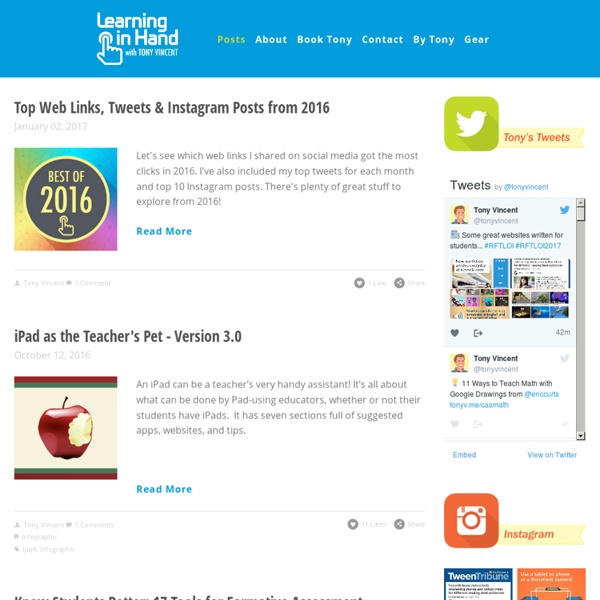



iLearn Technology 39 Sites For Using iPads in the Classroom Pages - Menu This Blog Linked From Here Sites to Follow Friday, October 7, 2011 39 Sites For Using iPads in the Classroom How Much Did Steve Jobs Change the World? 5 Great iPad Apps For Early Childhood Teachers10 iPad Apps Everyone Should Have- from PC Magazine10 Must Have iPad Apps for Students and Teachers10 Ways to Use iPads in Your Classroom40 iPad Apps Librarians Love40 Most Awesome iPad Apps for Science Students50+ iPad Apps By a Geography Teacher62 Interesting Ways to Use an iPad in the Classroom100 Incredibly Useful and Free iPad AppsBest Academic Reference Apps for the iPad- some $$, some freeA Day in the Life of the iPad ClassroomThe Debate Over iPads in EducationDigital Storytelling with the iPad Posted by Julie Greller at 7:24 AM Labels: ipads, ipads in the classroom, using ipads in the classroom Newer PostOlder PostHome
Cool Cat Teacher Blog Free Technology for Teachers iPad Curriculum The Innovative Educator Innovation Design In Education - ASIDE How to use mobile devices in the classroom | Teacher Network Blog | Guardian Professional In an interview earlier this year Education Secretary Michael Gove hinted that he would like to see mobile phones banned in schools. Claiming they lead to "disruption" and can be used for bullying, Mr Gove bracketed mobile phones and iPods in the same category as weapons such as knives. Many objected to this broadside with an online petition. As a former Director of E-Learning, teacher for seven years, and current educational researcher, I have witnessed transformational learning experiences where mobile devices such as iPods and mobile phones have been key. Modern mobile phones in particular are more like pocket computers and can connect young people to a world of information and learning. Part of the problem stems from the fact that all of us own a mobile phone and all of us went to school. That's not to say that all teachers want to see mobile devices used in the classroom, of course. You can view the lesson plan for yourself here and the presentation here.
Ellen Bremen | Author & Professor of Communication